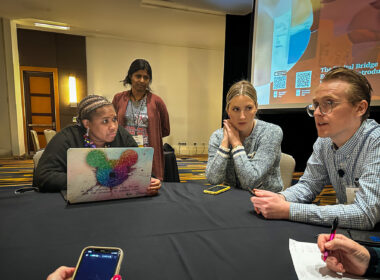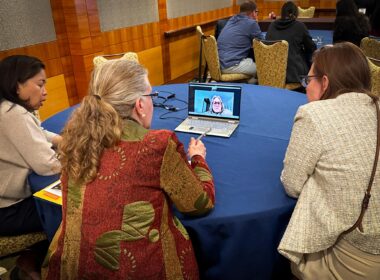Challenges and opportunities for innovation and digital disruption
Today’s Millennial medical learners are often disappointed by legacy instructional design that fails to address their unique learning preferences. The volume of new medical knowledge is outpacing our ability to organize and retain it. How might educators disrupt outdated practices through thoughtful use of technology and learning design? How might MOOCs, social media, simulation and virtual reality change the face of medical education? How might we make learning continuous, engaging, and scalable in the age of increasing clinical demands and limited work hours? This interdisciplinary course features thought leaders and innovators from medical education, instructional design, and learning technologies.
Course Directors:
Larry Chu, MD, MS
Associate Professor of Anesthesia
Executive Director, Stanford Medicine X
Stanford University School of Medicine
Kyle Harrison, MD
Clinical Associate Professor of Anesthesia
Palo Alto Veterans Affairs Hospital
Nikita Joshi, MD
Clinical Instructor, Emergency Medicine
Stanford University School of Medicine
Consulting Faculty
Anne Marie Cunningham, MB BCh, BAO, Medicine
Academic Lead for eLearning
School of Medicine at Cardiff University
MOST RECENT WEEKLY LECTURE
Stanford students wishing to enroll for academic credit should register for Anes 204. Limited in-class seating will be available for
community members and other non-enrolled guests. Click the link above to obtain more information about how to attend the class in person as a non-enrolled guest. This class is also available as a MOOC on OpenEdX. Register here: https://class.stanford.edu/courses/Medicine/ANES204/Fall2014/about
[accordion]
[accordion_section title=”Proposed Colloquium Topics”]
Proposed Colloquium Topics
-
- Introduction to Course (9/25/2014)
Larry Chu, MD, MS, Associate Professor of Anesthesia, Stanford University Department of Anesthesia. Dr. Chu is also Executive Director of Stanford Medicine X. Kyle Harrison, MD, Clinical Associate Professor of Anesthesia, Palo Alto VA Hospital and Nikita Joshi, MD, Clinical Instructor, Emergency Medicine, Stanford University School of Medicine.
- How humans think and learn as a framework for learning design and technology – Cognition and Learning (10/2/2014)
Dan Schwartz, PhD, Professor of Education, Stanford University Graduate School of Education - Bringing the patient voice to medical education – Digital tools for storytelling (10/9/2014)
Bryan Vartabedian, MD, Director of Digital Literacy, Baylor College of Medicine and Kirsten Ostherr, PhD, MPH, Director of the Medical Futures Lab, Rice University - Reimagining undergraduate medical education at Stanford (10/16/2014)
Charles Prober, MD, Senior Associate Dean for Medical Education, Stanford University School of Medicine
- Introduction to Course (9/25/2014)
-
- Simulation: A Tale of Beauty and the Beast (10/23/2014)
Christine Park, MD, Associate Professor of Anesthesia, Director of Simulation, Northwestern University - Connecting and collaborating online to empower learning in groups and harnessing distributed expertise – Social Media (10/30/2014)
Anne Marie Cunningham, MB BCh, MPH, academic lead for eLearning, Cardiff University - Interdisciplinary project-based collaborative online learning – The power of peer-to-peer learning (11/6/2014) Renate Fruchter, PhD, Founder of Project-based Learning Laboratory, Stanford University. Dr. Fruchter is also a lecturer in the Department of Civil and Environmental Engineering at Stanford and Senior Research Engineer thrust leader of “collaboration technologies” at the Center for Integrated Facilities Engineering at Stanford University.
- Massively learning together, scaling distributed learning – MOOCs (11/13/2014)
Daphne Koller, PhD, Rajeev Motwani Professor in the Computer Science Department at Stanford University and the Oswald Villard University Fellow in Undergraduate Education, Stanford University. Dr. Koller is also Co-Founder of Coursera. - Patient safety and the medical training process – Cognitive aids and changing the culture of safety (11/20/2014) Marjorie Stiegler MD, Director, Consortium of Anesthesiology Patient Safety and Experiential Learning (CAPSEL) , University of North Carolina, Chapel Hill and Loren Riskin MD, Anesthesiologist & Quality Improvement specialist at Stanford Hospital & Clinics
- Simulation: A Tale of Beauty and the Beast (10/23/2014)
- Virtual reality and emergent phenomena – Bringing virtual learning into the real world (11/27/2014) Parvati Dev, President, Innovations in Learning, Clinispace
[Online lecture only] - Speaking up across authority gradients – Challenging authority in different medical cultures (12/4/2014)
May C. Pian-Smith, MD, Associate Professor of Anaesthesia, Massachusetts General Hospital, Harvard Medical School
[/accordion_section]
[accordion_section title=”Speaker Photos and Bios”]
Speakers are listed in the order they will be speaking in the course.
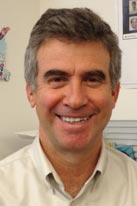
Professor Daniel L. Schwartz is the director of the AAALab at Stanford University. Dr. Schwartz taught middle-school for many years, before undertaking a PhD in Human Learning and Cognition at Columbia University. His niche is the ability to bridge basic research on human cognition with creative designs and experiments to improve STEM learning, often using computer technology.
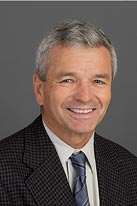
Charles Prober, MD, is senior associate dean for medical education and professor of pediatrics, microbiology and immunology at Stanford University School of Medicine. Dr. Prober has been involved in medical education throughout his career. He has directed a number of undergraduate and graduate student courses in the classroom and at the bedside, served as associate chair for education for the Department of Pediatrics, and lectured locally, nationally, and internationally on infectious diseases and medical education. As senior associate dean, he oversees undergraduate, graduate, and postgraduate medical education at Stanford.

Christine Park, MD, is associate professor of anesthesia and director of simulation technology and immersive learning at the Northwestern University Feinberg School of Medicine.

Anne Marie Cunningham is a general practicioner and Clinical Lecturer in Cardiff University, Wales, UK. She is the academic lead for eLearning for the University. Dr. Cunningham is interested in the use of new technologies to further medical education and to help others understand how to use these tools to become better doctors.

Daphne Koller is the Rajeev Motwani Professor in the Computer Science Department at Stanford University. Her main research interest is in developing and using machine learning and probabilistic methods to model and analyze complex domains. She is currently on leave from Stanford to serve as President of Coursera.
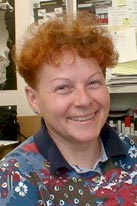
Renate Fruchter is the founding director of the Project Based Learning Laboratory (PBL Lab), lecturer in the Department of Civil and Environmental Engineering, and Senior Research Engineer thrust leader of “Collaboration Technologies” at the Center for Integrated Facilities Engineering (CIFE), at Stanford. She leads a research effort to develop collaboration technologies for multidisciplinary, geographically distributed teamwork, and e-Learning. Her interests focus on R&D and larger scale deployment of collaboration technologies that include Web-based team building, synchronous and asynchronous knowledge capture, sharing and re-use, project memory, corporate memory, and mobile solutions for global teamwork and e-Learning.
Loren Riskin MD is a board-certified anesthesiologist who has worked in policy, research, and technology in healthcare, always focusing on delivering value to patients and improving the healthcare system. Research and policy interests include quality improvement, medical technology, and complex systems management. Loren won the AMA Leadership Award. She subsequently served on the Obama Campaign Healthcare Advisory Committee in 2008. She has published on outcomes research, healthcare systems, and clinical anesthesia. Her academic background includes a degree in Ethics from Wellesley College, MD from Duke University, and anesthesia specialty training at Stanford University.
Marjorie Stiegler MD received her medical degree from Emory University and her residency training at the Massachusetts General Hospital. She completed several months of simulation training at the Harvard Center for Medical Simulation (CMS) in Boston, is a graduate of the Institute of Medical Simulation Instructor Training course, and has ongoing collaborations with CMS leaders on educational and research endeavors. Before joining UNC, she was a faculty member at UCLA, where she also completed a fellowship in medical education. At UNC, she is the director and co-founder of CAPSEL, and is a member of the Resident Education Committee and Patient Safety/Quality Improvement Committee. Dr. Stiegler serves nationally on the American Society of Anesthesiologists Patient Safety and Education Committee, and the Anesthesiology Quality Institute Committee for the Anesthesia Incident Reporting System. Dr. Stiegler is a Foundation for Anesthesia Education and Research (FAER) Grant recipient, has been a plenary session and highlighted speaker at top meetings including the PostGraduate Assembly in Anesthesia and the ASA Annual Meeting. She speaks widely on topics of patient safety, simulation, and medical decision-making.

Parvati Dev is the president of Innovations in Learning. She has 30 years of experience developing technology solutions applied to life sciences learning and research problems, including managerial experience leading groups 5 to 40 engineers and scientists in corporate and academic settings. At Stanford University she founded and ran an internationally recognized learning technologies lab, SUMMIT, with numerous firsts in multimedia, web and simulation for medical education.

May C. Pian-Smith, MD, MS is an associate professor of Anaesthesia at Harvard Medical School. As a Rabkin Fellow, and recipient of a Foundation for Anesthesia Education and Research (FAER) grant, Dr. Pian-Smith developed and implemented innovative curriculum at the Center for Medical Simulation to teach residents the skills and language of “speaking up”. Specifically the lessons foster collaborative questioning and challenging across hierarchical gradients, with the goal of improving resident education, enhancing the role and responsibility of residents in care teams, and supporting patient safety
[/accordion_section] [/accordion]



